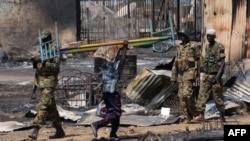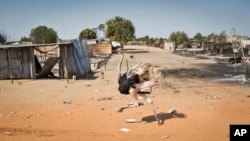A day after a top U.S. official warned that Washington will not hesitate to impose sanctions on anyone who blocks peace in South Sudan, army and opposition forces fought for control of Bentiu, the capital of the country's second biggest oil-producing state.
James Gatdet Dak, a spokesman for former vice president turned opposition leader Riek Machar, said anti-government forces took control of the town early Tuesday.
But Sudan People’s Liberation Army (SPLA) spokesman, Colonel Philip Aguer, said army troops were still in the town as of Tuesday afternoon, and the fighting was continuing
“We are waiting for reports from our field command. There is still fighting over Bentiu,” Aguer said.
Neither side was able to give casualty numbers.
Gatdet said the anti-government forces have given companies in the country’s two oil-producing states, Unity and Upper Nile, one week to halt operations. The opposition wants to shut down oil production to prevent the government of President Salva Kiir from using income from sales of crude to buy weapons, he said.
Joseph Contreras, the acting spokesman for the United Nations Mission in South Sudan, said five foreign oil workers were injured in the fighting in Unity state, two of them critically. U.N. peacekeepers evacuated 10 foreign oil workers Monday after they were caught up in attacks on an oil refinery some 30 kilometers (18 miles) outside Bentiu.
Unity state produces around 15 percent of South Sudan's oil, while Upper Nile produces the remaining 85 percent. Both states have seen fierce fighting since unrest erupted in South Sudan in December.
Opposition forces captured Bentiu early on in the conflict, only for the town to be rectaken by the government in December before rebels seized it again in January.
The United Nations Assistant Secretary General for Human Rights, Ivan Šimonović, said in January after visiting Bentiu that the town "simply did not even exist any more" after weeks of fighting.
Gatdet said some of the thousands of residents of Bentiu who had sought refuge at the U.N. base in Bentiu were celebrating the town's takeover by opposition forces, and some of them felt safe enough to leave the U.N. facility.
“The civilians in the U.N. compound have come out dancing, singing, ululating and welcoming the rebels inside the town,” he said.
U.N. officials could not confirm that civilians were leaving the camp.
The United Nations, United States and other members of the international community have criticized both sides for failing to observe a cessation of hostilities agreement reached in late January.
In an interview published Monday by South Sudan in Focus, U.S. Special Envoy to South Sudan and Sudan, Donald Booth, said Washington's threat to slap sanctions on anyone violating human rights or obstructing the peace process in South Sudan is not just a hollow warning but will be put into action unless the warring sides stop fighting and respect the January peace deal.
"As I have continually warned, for those who continue to obstruct the peace process, we will take action," Booth said.
Peace talks between the two warring sides are on a three-week recess and are due to resume next week.
James Gatdet Dak, a spokesman for former vice president turned opposition leader Riek Machar, said anti-government forces took control of the town early Tuesday.
But Sudan People’s Liberation Army (SPLA) spokesman, Colonel Philip Aguer, said army troops were still in the town as of Tuesday afternoon, and the fighting was continuing
“We are waiting for reports from our field command. There is still fighting over Bentiu,” Aguer said.
Neither side was able to give casualty numbers.
Gatdet said the anti-government forces have given companies in the country’s two oil-producing states, Unity and Upper Nile, one week to halt operations. The opposition wants to shut down oil production to prevent the government of President Salva Kiir from using income from sales of crude to buy weapons, he said.
Joseph Contreras, the acting spokesman for the United Nations Mission in South Sudan, said five foreign oil workers were injured in the fighting in Unity state, two of them critically. U.N. peacekeepers evacuated 10 foreign oil workers Monday after they were caught up in attacks on an oil refinery some 30 kilometers (18 miles) outside Bentiu.
Unity state produces around 15 percent of South Sudan's oil, while Upper Nile produces the remaining 85 percent. Both states have seen fierce fighting since unrest erupted in South Sudan in December.
Opposition forces captured Bentiu early on in the conflict, only for the town to be rectaken by the government in December before rebels seized it again in January.
The United Nations Assistant Secretary General for Human Rights, Ivan Šimonović, said in January after visiting Bentiu that the town "simply did not even exist any more" after weeks of fighting.
Gatdet said some of the thousands of residents of Bentiu who had sought refuge at the U.N. base in Bentiu were celebrating the town's takeover by opposition forces, and some of them felt safe enough to leave the U.N. facility.
“The civilians in the U.N. compound have come out dancing, singing, ululating and welcoming the rebels inside the town,” he said.
U.N. officials could not confirm that civilians were leaving the camp.
The United Nations, United States and other members of the international community have criticized both sides for failing to observe a cessation of hostilities agreement reached in late January.
In an interview published Monday by South Sudan in Focus, U.S. Special Envoy to South Sudan and Sudan, Donald Booth, said Washington's threat to slap sanctions on anyone violating human rights or obstructing the peace process in South Sudan is not just a hollow warning but will be put into action unless the warring sides stop fighting and respect the January peace deal.
"As I have continually warned, for those who continue to obstruct the peace process, we will take action," Booth said.
Peace talks between the two warring sides are on a three-week recess and are due to resume next week.





